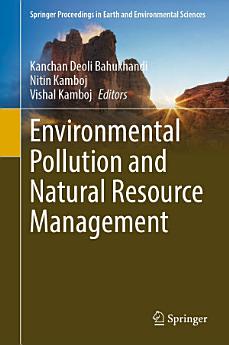Environmental Pollution and Natural Resource Management
អំពីសៀវភៅអេឡិចត្រូនិកនេះ
The development strategies must therefore be shaped by the following components:
- The satisfaction of basic human requirements
- The eradication of poverty
- Self-reliant and participatory development
- Environmental consciousness
Technology has to play a critical role in the process of changing industrial society. But innovation has to be embedded in social and organizational innovation. This book provides a wide range of research articles in the area of science and technology, sustainability, natural resource management, ecology and its environmental fields, geosciences and geology, atmospheric sciences, sustainability, climate change, and extreme weather, global warming, and environmental change, the effect of climate change on the ecosystem, environment, and pollution.
អំពីអ្នកនិពន្ធ
Dr. Kanchan Deoli Bahukhandi is Graduate in Water Resource Management & Environmental Science. Subsequently, she acquired Masters of Science in Environmental Science, Post Graduate Diploma in Health Safety and Environment and PhD in Water Quality Assessment - Hydrochemistry from Wadia Institute of Himalayan Geology and UPES. Presently, she is working as Associate Professor in Sustainability Cluster (Civil & HSE), UPES, Dehradun, India. She is having around 20 years of teaching and research experience in the field of environmental science. She has published more than 40 research papers in peer reviewed journal, 15 book chapters and published 2 books. She has completed various research projects funded by Ucost and DST in the area of EIA of Doon Valley, An Expert System for Solid Waste Management and Product Penetration and Consumption pattern in rural area of Uttarakhand and DST funded project WTP Women Technology Park Identification and cultivation of Medical Aromatic Plant.
Dr. Nitin Kamboj is working as Senior Assistant Professor of Environmental Science in the Department of Zoology and Environmental Science, Gurukula Kangri (Deemed to be University), Haridwar. He started his career in research from Wildlife Institute of India, Dehradun, Govt. of India. He has an academic experience of about 14 years and research experience of about 16 years. His interest of research area is watershed management, environmental impact assessment (EIA), environmental pollution, river bed mining, and solid waste management. He has published 46 research paper in national and international reputed journals and also attended many conferences/ seminars/symposia at national and international level. He has authored various text book on environmental studies.
Dr. Vishal Kamboj is Young Researcher working in the field of environmental pollution, aquatic biodiversity, and environmentalimpact assessment. He received his Ph.D. in Environmental Science from Gurukula Kangri (Deemed to be University), Haridwar. He has awarded INSPIRE Fellowship funded by the Department of Science and Technology (DST), New Delhi, India, during their Ph.D. program. He has published 14 research papers in national and international peer reviewed journals. He has 17 conferences abstracts and 14 book chapters in his credit. Recently, he has obtained Young Researcher Award (2020) organized by Institute of Scholars (InSc), India. His most recent publication is “Spatial and temporal variation of zooplankton assemblage in the mining-impacted stretch of Ganga River, Uttarakhand, India” in Environmental Science and Pollution Research (JCR Impact factor- 3.052).



